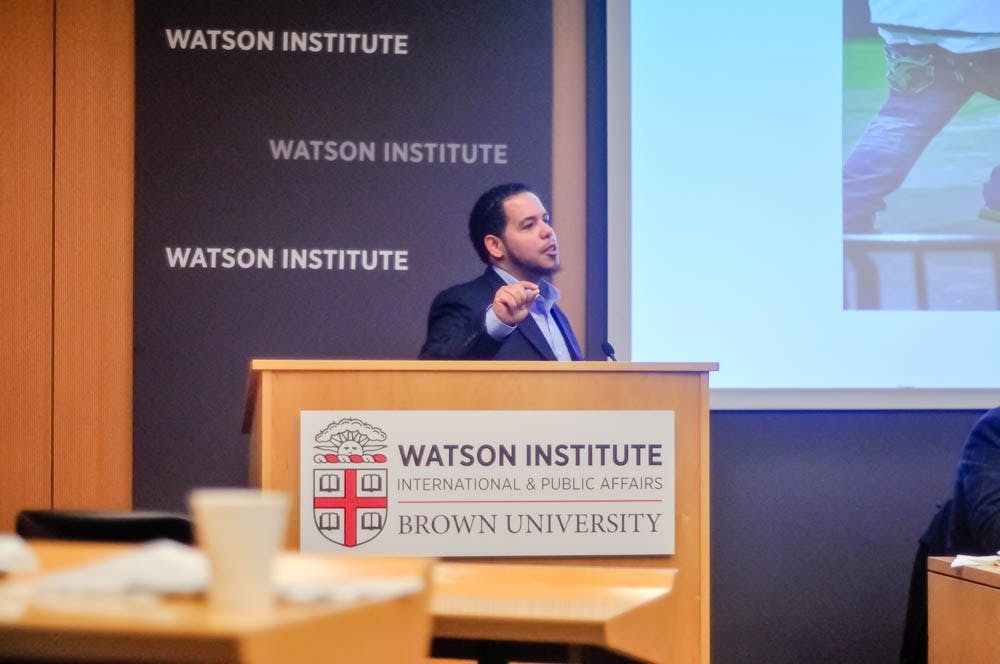The Watson Institute for International and Public Affairs hosted a discussion Tuesday titled “The 2016 Presidential Election and the Hispanic Vote” on the growing importance of Hispanics and Latinos in U.S. politics. While speakers addressed most of the questions in the context of the current elections and the critical March 15 primaries, they also drew from larger trends among Hispanics and Latinos, who combined constitute the second largest demographic behind whites in the United States, according to U.S. census data.
The Latino population has often been considered a “sleeping giant,” said Heather Silber Mohamed, assistant professor of political science at Clark University. The voter turnout of registered Latino voters has always been consistently lower than non-Hispanic white and black voters, she noted. In 2008, the turnout for Latino, non-Hispanic white and black voters was 50, 66 and 65 percent respectively, according to a Brookings Institution chart featured in her presentation.
Moderator Felipe Martínez-Pinzón, assistant professor of Hispanic studies, noted in his introduction that Republican frontrunner Donald Trump’s antagonizing rhetoric is adding new vigor to the mobilization of Hispanic and Latino communities and driving a surge in registration that will hopefully translate into increased voter turnout.
Silber Mohamed said that Democratic-leaning Latinos indeed appeared to be “positioning themselves” for a strong showing, but added that the political inclinations of the Latino demographic are notoriously difficult to predict. “All bets are off,” she said.
Domingo Morel MA’11 PhD’14, visiting lecturer in political science at Wellesley College, said that in North Carolina, registered Latino voters have boomed from 10,000 voters in 2004 to 114,000 in 2012. But he is more interested in the “power of Latino people beyond turnout (and) beyond voter registration,” he added.
Morel said that because the Latino population has grown to 55 million — up from 9.6 million in 1970 — greater emphasis should be placed on “how they have been able to influence and shape our discourse.”
Showing an image of a two protestors of color celebrating after Trump canceled a speech in Chicago Friday due to protest efforts made by a coalition of minority student groups, he noted the significant political impact that can be made outside the voting booth.
In advance of the upcoming primary results coming out of Florida, which has a high Cuban population, Morel concluded by citing figures showing a steady change in the political leanings of Cuban-Americans, a longstanding GOP bastion within the Latino demographic now shifting towards the Democratic Party.
He agreed with Martínez-Pinzón that Trump’s rhetoric is helping to mobilize Latinos for the Democratic cause, adding that “Donald Trump may really be problematic beyond 2016” for Republicans.
Daniel Denvir, a Providence-based contributing writer at Salon, assessed the forces behind the Trump groundswell. His campaign is “about a fortress America that’s safe economically and physically,” Denvir said.
“A lot of the condemnation and protesting of him seems a little bit insincere, especially from the right,” Denvir said. Trump is just “saying with a megaphone what they had always been whispering.”
He described how the perceived threat of immigrants crossing the Mexican border was reinforced by the murder of Kathryn Steinle by an undocumented immigrant in San Francisco, serving as a lightning rod for criticism of so-called “sanctuary cities,” he said.
Republican leaders aside, Denvir also found fault in the Obama administration’s implementation of the Secure Communities program, which made it so that “undocumented immigrants picked up for any sort of crime could then be deported from our country.”
This policy is partially responsible for “linking immigration and criminal threat together,” he added.
From the audience, Nnamdi Jogwe ’19 asked if U.S. Sen. Marco Rubio, R-FL and U.S. Sen. Ted Cruz, R-TX, “necessarily even want the Latino vote?”
“No,” Morel answered flatly. To Rubio and Cruz, gaining Latino votes are not as important as “the white voter,” he said. “It’s a tradeoff you have to make” in calculating the votes needed to win.
Denvir said this lack of commitment is “why we have Marco Rubio flirting with comprehensive immigration reform in 2013” before pulling back. Rubio suspended his campaign late last night after losing the Republican primary in his home state of Florida to Trump.
Silvina Hernandez ’17 asked the speakers to comment “on the effects of Donald Trump on voters.”
Martínez-Pinzón decried the lack of diversity, discussion and nuance in recent American politics that Trump has capitalized on. Latin Americans, he added, “are very used to that sort of political speech” that marries violence with political allegiance, referring to the language used by the region’s many political dictators throughout history.





